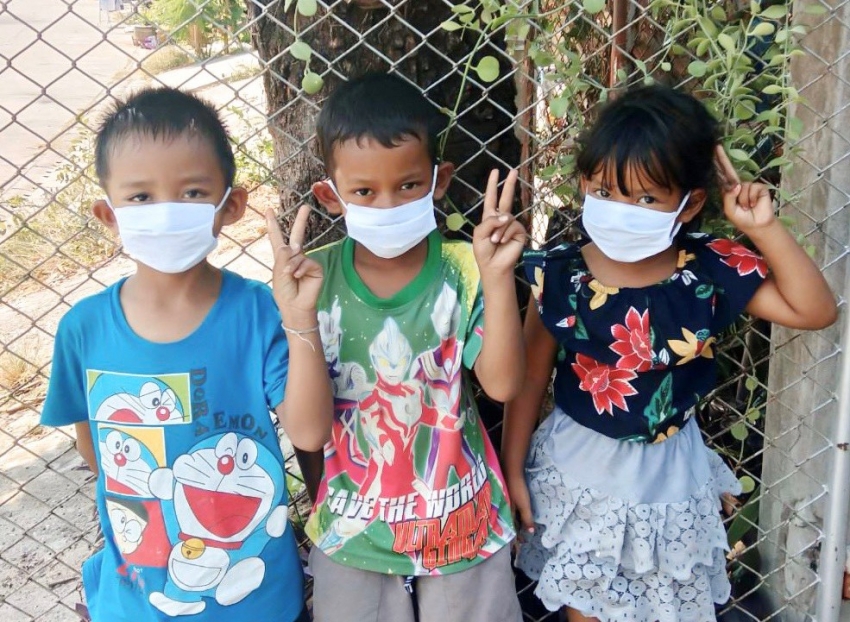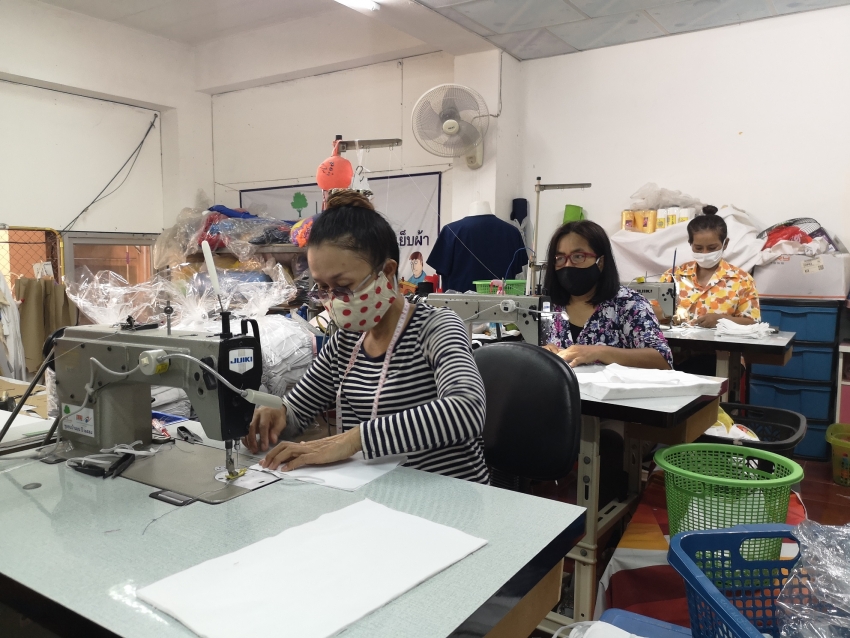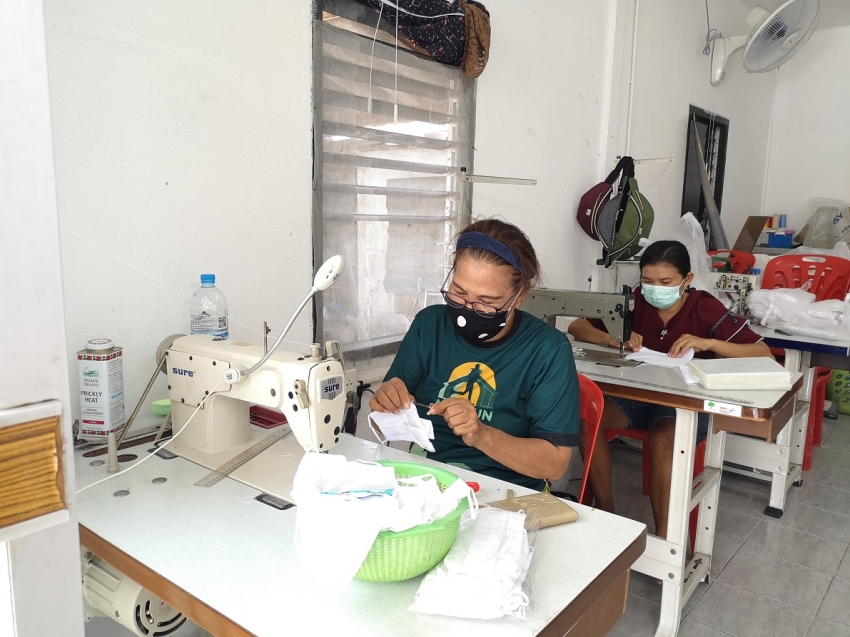During the COVID-19 pandemic, apart from protecting yourself and your loved ones by practicing social distancing, another major concern is how to earn a living and feed the family in such a time of crisis.
“There are several textile and craft community enterprises in Rayong. They usually make bags and clothes for sale in retail stores and flea markets in local industrial zones. However, the COVID-19 outbreak brought all activities to a halt, as everyone stayed at home to stop the spread. Therefore, as they had always been working closely with local community enterprises, the CSR team of SCG’s Chemicals Busines started brainstorming for ideas to help them make it through this crisis. With the conviction that “there’s always an opportunity in every crisis,” our team initiated the ad hoc Cloth Face Masks by and for Local Communities Project, in which we built a network of cloth face mask production and helped these enterprises find affordable materials, from muslin and elastic bands to even clear plastic packaging for the masks,” said Namthip Samphowprasert, Brand Management and CSR Director of the Chemicals Business, SCG, as she recounted the origin of the project.
Enlisting allies for the special face mask production mission
During the time when medical face masks were so scarce, cloth face masks were the second best alternative. The Chemicals Business learned from the the Division of Public Health and the Environment of Map Ta Phut Municipality that fabric masks were suitable for healthy people and could be washed and reused. In addition, as the face mask pattern was obtained from the Department of Medical Sciences, the Ministry of Public Health, local residents could rest assured that the product would be able help protect them from COVID-19. The next step then was sewing, which was an area of expertise of these textile and craft community enterprises. To this end, SCG built a face mask production network, led by community enterprises in Map Ta Phut and Ban Chang, to teach local seamsters how to sew face masks, which not only created new jobs for these enterprises but also enabled many people who were forced to stay at home at the time and had income to earn a living. Another partner of the project was Bangkok Synthetics (BST).
Cloth face masks by and for local communities
As a result of the collaboration between SCG, BST, and the community enterprises, more than 36,500 pieces of face masks were produced in less than a month and distributed to 72 communities in three municipalities, which were Map Ta Phut, Map Kha Phattana, and Ban Chang. This number also included masks designed specifically to fit children’s faces to ensure that local children were well protected. Thanks to this project, local residents of Rayong were equipped in time to comply with the announcement of Rayong’s Communicable Disease Committee that made wearing medical face masks or cloth face masks in public places mandatory across Rayong. Due to this concerted effort against COVID-19, there was no longer any case of infection reported in Rayong at the time of writing.
The great power of sharing
Besides producing masks for the Cloth Face Masks by and for Local Communities Project, the local community enterprises also gave away their products to the public.
These mangosteen-dyed and indigo-dyed muslin face masks are products of Tan Batik Community Enterprise, led by Pailin “Tan” Dongdang, which is known for its indigo-dyed textile products. However, once the COVID-19 pandemic brought on a severe face mask shortage, Tan enlisted the members to make face masks out of fabric dyed with mangosteen rind in order to help alleviate the health crisis and generate income for her community.
“Our members and I want to offer help during this crisis. With our expertise in textile craft, our Tan Batik Community Enterprise has volunteered to make cloth face masks. The idea is to use a dye made of the rind and leaf of mangosteen, which is a local fruit of Rayong, to produce a brownish fabric that is safe for wearers. We have received support from SCG and the Thailand Institute of Scientific and Technological Research in extracting pigments from mangosteen rind and leaves. Each face mask is washed and sterilized before packing to ensure the safety of the children and other local residents who receive Tan Batik’s mangosteen-dyed muslin face masks.” Pailin Dongdang,
Chairperson of Tan Batik Community Enterprise, Rayong
At the same time, upon learning that many were struggling to get their hand on face masks, Prakong Koedmongkol, Chairperson of Map Chalud Textile Community Enterprise in Rayong, enlisted the members and those with no income at the time to produce muslin face masks, applying the group’s expertise in sewing bags to the task.
“Now, we have more than 20 people to help make muslin face masks, consisting of our members and people who have been affected by the COVID-19 pandemic. They have been taught by our members. Previously, our main problem was that the materials, such has fabric, thread, elastic bands, and clear plastic bags for packing face masks, were both scarce and expensive. Luckily, the SCG team and the community enterprise network helped us find cheaper materials and plan our production, which has given us enough time to sew and check the quality of our face masks.” Prakong Koedmongkol, Chairperson of Map Chalud Textile Community Enterprise, Rayong
Similarly, Ban Bon Sewing Community Enterprise in Rayong, led by Pawinee Buanak, recruited volunteers to learn how to make muslin face masks and help Rayong residents get through the COVID-19.
“After Songkran Festival was canceled in an attempt to prevent the spread of COVID-19, we saw a huge drop in the number of orders for our Songkran clothing. Admittedly, we were quite badly affected. However, there was a severe shortage of face masks at the time, so I persuaded the members to change course and make muslin face masks instead. As it turned out, we received overwhelming feedback and so many orders that we had to ramp up our production. As for those who have lost their source of income as a result of COVID-19, I’m willing to teach them for free. I think this is a good thing that they can use this to earn a living in the future.” Pawinee Buanak, Chairperson of Ban Bon Sewing Community Enterprise, Rayong
Muslin: Material of choice for healthy people
Muslin is chosen as a material for face masks because it can trap small particles, prevent droplets from seeping through, and can be washed and reused many times. Made of a rectangular piece of muslin with a pleat across the middle part and elastic band earloops, the face mask can be washed and reused, thus decreasing the amount of waste generated by disposable masks.
In addition, out of care for children, who are at greater risk of COVID-19, the community enterprises have also designed muslin face masks with elastic bands that comfortably fit the face of children of 5-8 years old.
Over the past month, the textile and craft community enterprises in the network of SCG’s Chemicals Business produced more than 50,000 pieces of face masks altogether, generating over THB 800,000 for themselves and their communities. With the belief that there is an opportunity in every crisis, everyone refuses to let this crisis be an obstacle, but rather uses this crisis to create an opportunity and work together to overcome this plight.
If you’re interested in purchasing local muslin face masks, please contact Tan Batik Community Enterprise (Tel. 086 140-6699), Map Chalud Textile Community Enterprise (Tel. 081 649-1089), and Ban Bon Sewing Community Enterprise (Tel. 099 535-5624).







